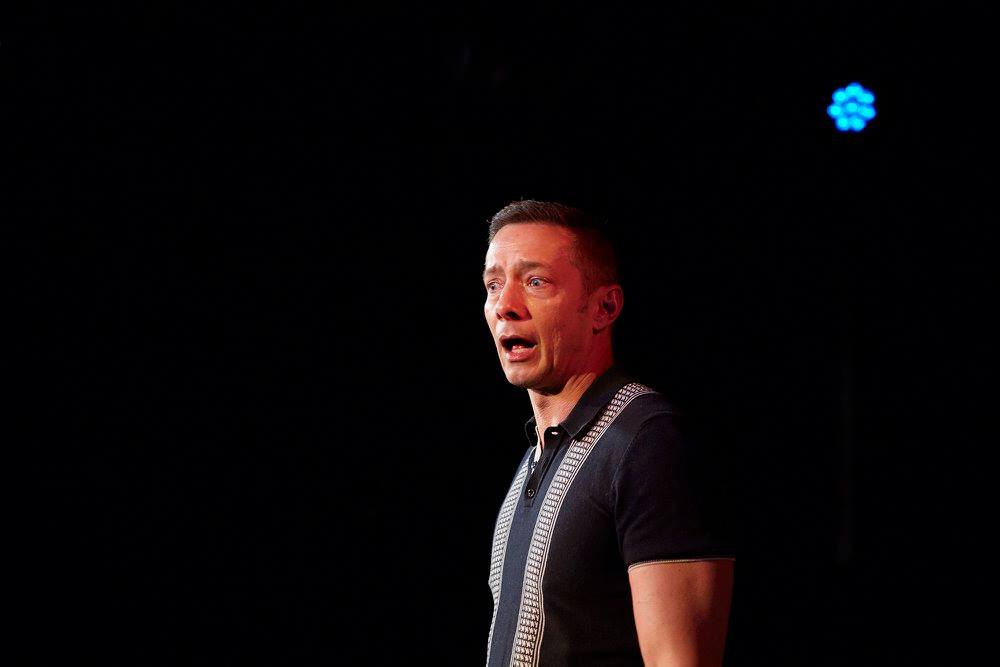As renowned play The Chemsex Monologues comes to the all-new Above the Stag Theatre for the Pride in London 2018 festival, writer Patrick Cash reflects on how he first came across chemsex:
I wrote The Chemsex Monologues in 2016, in order to show the real lives of people caught up in this world.
I’d been working at London’s gay nightlife magazine QX, where I’d been seeing mephedrone, G and crystal meth – a so-called ‘holy trinity’ of drugs – as rife on the scene.
Otherwise known as getting high and horny or party and play – those who take part in chemsex do so to change the sex they are having. In some cases, the mostly gay and bi men who use chems, will ‘slam’ or inject these drugs.
I remember standing in one Vauxhall club, looking around the smoking garden, and thinking: ‘why is every single gay man in this club off his face on drugs?’ I began to research the subject.
The first person I interviewed was David Stuart, a man whose name has become almost synonymous with chemsex; apt, given it was he who coined the term. David had just been appointed as sexual health clinic 56 Dean Street’s first Substance Use Lead.
‘People use drugs to serve the purpose they need addressing,’ he said. ‘It’s tied up with fear and rejection. Too many gay guys are in bed and not feeling horny sober.’ In short, he spoke of drugs as an escape.
‘Daniel the Sexual Health Worker’, played here by Matthew Hodson | Photo: Dionysis Livanis
‘Sometimes it feels like there’s this huge sex party going on in the city – and nobody’s sent me an invitation.’
Matthew, who plays Daniel, says: ‘People wonder how much Daniel and I are alike. In my understanding of Daniel, we are both living with HIV. Like Daniel, I’m conscious of getting older on a gay scene that prizes youth and beauty. But Daniel is full of hope, optimism and love, qualities that I cherish, so I enjoy slipping into the character and seeing the world through his eyes.’
For some, chemsex is about escaping
Personally, I could fully understand the idea of utilizing a substance as a fire exit for the mind.
Throughout my twenties, I struggled with controlling my alcohol use. When eventually I ended up in a traumatic incident of which I had no memory, I had to stop drinking for a year at the age of 29.
During that period all kinds of issues surfaced that I’d been self-medicating with booze, to do with my sexuality: self-esteem, gay shame, loneliness and a need for connection.
Whilst misuse of alcohol is mostly understood by society, the illegality of chemsex drugs limits sympathy for their users.
Even now when publicising The Chemsex Monologues, Tweets pop up hysterically screaming at gay men not to take drugs, mostly written by other gay men.
It’s understandable: most societies don’t encourage their citizens to question laws, even though adaptability of law is a sign of a successful society.
After all, gay sex was illegal until 1967.

Kane Surrey performing | Photo: Kane Surry
‘This boy’s beauty might save me from my own embarrassment, the intoxicating wish to dull my own shine.’
The narrator played in this run by Kane Surry, he says: ‘What I love about playing the Narrator is that he is like the Everyman of the play – someone who can ease the audience into this world that many haven’t explored.’
‘We need to treat harmful drug use with empathy rather than judgment.’
Our outdated drug laws prevent us from perceiving the real root of drug use. It’s to do with happiness.
The academic Yuval Noah Harari writes in Homo Deus that ‘what some people hope to get by studying, working or raising a family, others try to obtain far more easily through the right dosage of molecules. This is an existential threat to the social and economic order, which is why countries wage a stubborn, bloody and hopeless war against biochemical crime.’
The Chemsex Monologues coheres with this recent shift in global thinking on drugs; that we need to treat harmful drug use with empathy rather than judgment.
The writer Johann Hari expands eloquently on this concept in his TED Talk ‘Everything you think you know about addiction is wrong’, based on his excellent book Chasing the Scream. Russell Brand, a former heroin addict himself, has called for ‘compassion’ for drug users and decriminalization.
If we admit that drug use is not some inherent flaw in the user, and in fact to do with human happiness and well-being, then it becomes harder to separate the drug user from the ‘non-drug user’.
In fact, the twink smothering their school years with tequila at Heaven, the middle-aged queen discreetly asking their GP for Prozac, and the ‘good gay’ lawyer who turns their flat into a crystal-smoking chillout at the weekends, are all basically on the same page. Let’s escape.

‘Nameless’ played here by Denholm Spurr | Photo: Dionysis Livanis
‘“Why don’t we just leave now?’ I said. He looked at me. ‘There’s nowhere to go…”‘
Denholm plays nameless in the new run. He says: I’ve grown with the character so much over the last few years. When I started playing him I felt almost as nameless as he is, now my name couldn’t be more clear. It’s been a bit like therapy: playing Nameless has helped me understand myself and my life as a gay man.
A conversation about Chemsex is just as much about mental health too
What we are talking about here is mental health. More than anything, The Chemsex Monologues is a play about mental health; the clotheshorse that has long worn the cloak of drug use.
There are other ‘escapes’ mentioned in the play: including porn, social media, and hook-up apps.
It’s just been announced that the NHS is going to fund an internet addiction clinic run by Henrietta Bowden-Jones; her husband Owen leads on gay men and chemsex.
I haven’t written this article, or indeed The Chemsex Monologues, to paint all gay men as mentally ill and unhappy.
That’s evidently not the case.
However, I do feel that when we are faced with a symptom of poor well-being in our community, as I believe chemsex to be, then it benefits the whole community to spread compassion.
That’s why, in the midst of the G overdoses and the slamming, each monologue ends with a character caring for another.

The Chemsex Monologues ‘Fag Hag Cath’ played here by Remy Moynes | Photo: Remy Moynes
‘I look at Steve, streaked in fake tan, staring at me in mephed-up consternation across the room… “Wake up, Steve,” I say. “I just want you to wake up.”‘
Fag Hag Cath is played by Remy Moynes in the new run, she says: ‘For me, Cath provides the heart in the piece: she has some early comedy moments, and later, some of the darkest as well, and the audience gets to go on a real journey with her. I think it’s really important that we hear from people who are affected by, but not necessarily directly involved in, the chemsex scene. It’s a viewpoint that could be easily forgotten.’
The Chemsex Monologues is at Above the Stag Theatre, 72 Albert Embankment, Vauxhall, SW1 7TP from 1-4 July, part of Pride in London 2018. To book tickets, click here.
You can listen to excerpts from the Monologues here:
Read more from the Gay Star News Chemsex series:
The gay community has to get over its unhealthy addiction to drugs







